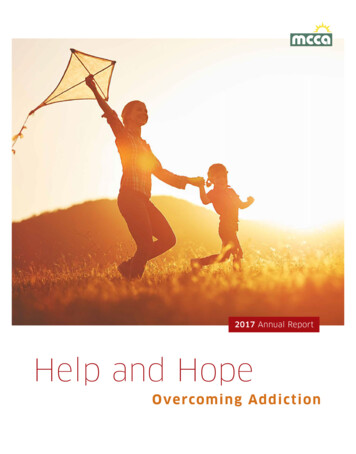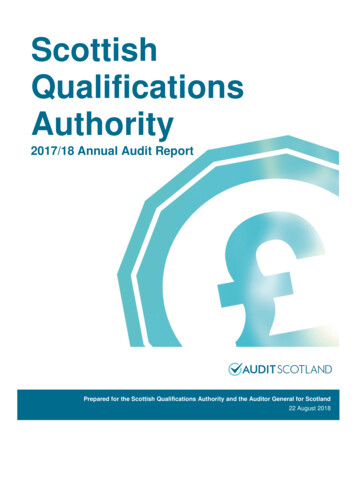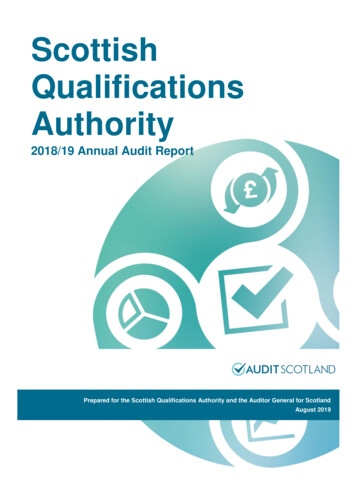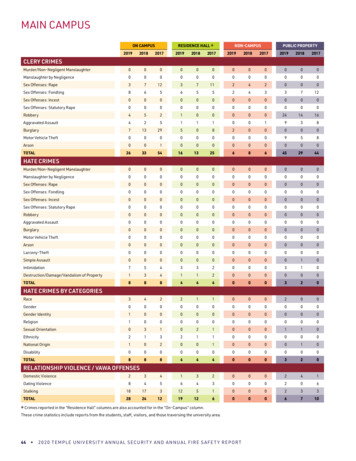
Transcription
2017 Annual ReportHelp and HopeOvercoming Addi cti on
Dear MCCA Staff and Associates,The overarching focus for the agency during myfirst full-year at the helm was streamlining andstrengthening from within.In 2017, we made significant gains in improving our internalprocesses and physical facilities, as well as updating ourtechnology–all in order to provide optimal patient care in anevolving healthcare landscape.During the past year, we invested in Lean Management trainingto improve our operational and clinical procedures, as well astechnology with the installation of SMART Boards and enhancementsto our Electronic Health Record system. Accuracy and clinicalappropriateness of all aspects of treatment planning has continuedto be a priority for our seven busy outpatient clinics.In July, we opened our seventh outpatient clinic after purchasinga new property in downtown Bridgeport. In the fall, our busyWaterbury clinic found a permanent home in the heart of thecity with a property that MCCA purchased and refurbished. Asthe year came to a close, a much-needed renovation of ourheadquarters in Danbury wrapped up.Foremost on our minds is being proactive in addressing theopiate crisis. In September, we gathered to remember the manylives lost to addiction at a candlelight vigil at Tarrywile Park.In 2018, we look forward to continuing collaborating andstrengthening our relationships with our community partnersas we move forward with Medication Assisted Treatment (MAT).I’d like to recognize and thank our staff, funders, donors, andcommunity partners in supporting our mission to provide HELPand instill HOPE for individuals, families and organizationsworking to overcome and prevent addictions.Sincerely,John D’EramoPresident and CEO
Our Mission & VisionMISSION: MCCA’s mission is to provide HELP and instill HOPE forindividuals, families and organizations working to overcomeand prevent addictions.VISION: Our vision is to be the premier prevention and treatmentorganization in Western Connecticut by providing state-ofthe-art programs designed to achieve measurable resultsthat bring value to customers and partners.
Community Vigil at TarrywileOn September 27th, friends and family gathered at TarrywilePark in Danbury to remember loved ones who lost their livesto the disease of addiction.It was a warm night and the skywas clear as people gathered in theopen field beside Tarrywile’s big redbarn. A handmade quilt memorializingindividuals who died from opiateoverdoses was on display, courtesy ofthe Department of Mental Health andAddiction Services (DMHAS).Deb Gurney, Program Director for MCCA’s Danburyoutpatient clinic, and her staff felt the need tobring family members and friends together fora healing community vigil. As the day came to aclose, names, messages and poems were read forthose lost, and candles were lit as the group sangAmazing Grace.This is the fifth year in a row that Connecticuthas seen a significant increase in opioid deathsin the state; in 2012 there were 357 deaths. In2015 that number jumped to 729, and in 2016,917 people lost their lives to an opioid-relatedoverdose. Sadly, we are certain to see that numbersurpass 1000 in 2018.
Streamlining and Strengthening2017 brought many exciting changes to MCCA. As John D’Eramosettled into his new position as President and CEO, a months-longrenovation project finished up at the agency’s headquarters at38 Old Ridgebury Road.This long overdue upgrade wasmade possible by state bond funding.While the renovation posed logisticalchallenges for the staff working inthe building, nobody was sad to seethe 1970s décor go and contemporaryflooring, bright new walls, andbeautiful artwork fill the halls,offices, and meeting rooms.In April, MCCA purchased a building at 140 JohnStreet in the heart of Bridgeport, expanding theirservices to a city in need of additional substanceabuse treatment. By July, MCCA was ready toopen the doors to the Bridgeport clinic, bringingtheir total number of outpatient clinics to seven.Seasoned Program Director, Victor Pittman, whosuccessfully ran the New Haven outpatient clinic,stepped in as the director of this very busy clinic.The Waterbury outpatient clinic found a new homein 2017 after the agency purchased a property at34 Murray Street. The new building provides muchneeded space for this busy outpatient clinic thatserves approximately 250 clients each month.The building is centrally located in the city and isaccessible by public transportation.
As the opiate crisis continues to escalate in Connecticut, MCCA hasbeen proactive in seeking opportunities to expand and improvetreatment options during this time of increased need. In 2017,MCCA was awarded a number of state grants that will enablethem to achieve these objectives. The agency also worked towardsstrengthening their relationships with other community providers.Furthering our Mission.Moving Forward with MATIn 2017, MCCA was awarded a grant by DMHASto develop a Medication Assisted Treatment (MAT)program. The focus of the grant is to treatindividuals for opiate dependence withSuboxone. Recovering from opiateaddiction is extremely challenging,and it can take months to years beforethe brain returns to normal functioning.However, research shows that acombination of Suboxone andtherapy can successfully treatopiate addiction for some individualsstruggling with this pervasiveaddiction, and help sustainrecovery. Primarily used for thetreatment of addiction to opioids,the prescribed medicationoperates to normalize brainchemistry, block the euphoriceffects of opioids, and relievephysiological cravings withoutthe negative effects of theabused drug.DMHAS –Consumer SatisfactionSurvey ResultsMCCA is proud to consistently be among one of thehighest ranking providers in the state. Every yearDMHAS conducts an annual survey with individuals in recovery in order to better understand theirexperiences with their public state-operated andcommunity-funded nonprofits. General Satisfaction 82% Access 86% Participation in Treatment 92% Quality & Appropriateness 91% Respect 89% Outcomes 83% Recovery 84%
Twenty Years of TrustMCCA was granted an award of appreciation fortheir longstanding partnership with the Workers’Compensation Trust (WCT). The two agencies haveworked together for 20 consecutive years to providea safer workplace for MCCA’s employees andprovide benefits and assistance to injured workersas needed. The WCT is a comprehensive workers’compensation insurance program designed to meet theunique needs of the Connecticut healthcare industry.Longevity with the Trust has provided MCCA withsignificant benefits including over 94,000 in premiumreturns, training, educational programs, and a costeffective workers’ compensation insurance program.with Partnerships & GrantsDUI OffendersBenefit fromTreatmentFor the past 15 years,DERBYNEW HAVENMCCA has beenproviding Pre-trialIntervention Program(PTIP) services toclients in theirDanbury, Torrington,and New Milford outpatient clinics. In 2017, theyhad an opportunity to rebid their contract andsuccessfully added two additional sites – Derbyand New Haven. Every person who is arrestedfor driving under the influence of drugs or alcoholis referred to PTIP, a drug and alcohol educationprogram administered by DMHAS. In 2017, MCCAsaw an upward trend in the referrals to theirprogram. Lauren Miska, the Manager of MCCA’sPTIP stated that, “One third of the individualswho come into our PTIP program are referredto treatment. This more intensive program givesclients a better chance of recovery.A Pathway To TreatmentIn September, Blake Reuter, a clinician at MCCA,took on a new role with the Treatment PathwaysProgram (TPP) at the Torrington Court House. Inthe first seven days on the job, he placed sevenaddicted individuals into treatment who previouslywould have gone to jail. Reuter said, “Instead ofoverwhelming the jail population, they are trulyoffering an opportunity for treatment that could behelpful and beneficial to this person.” The goal ofthe program is to divert addicted individuals whohave been arrested for non-violent offenses intosubstance abuse treatment, instead ofincarcerating them. TPP is a court-basedpretrial diversionary collaborationbetween the Judicial Branch’s CourtSupport Services Division and theTorrington Court, and is welldesigned to identify clients whoare most likely to succeed.
Crossingthe LineLife was good for Jon Price, a bright,articulate college-educated guy. Inthree and half years, Jon earned aB.A. in Economics and a B.S. in PoliticalScience from the University of SantaClara. After college, he excelled in acareer in sales, with his easy-going,witty personality.Drinking was simply a part of the job; he wasjovial and happy when he drank and the clients lovedhim. He quickly moved up the ranks selling softwareto government agencies. Life was good. Jon had agreat job, a wife, two boys, and a nice home inNew Milford, Connecticut – until 2009.The previous year, the housing bubble burst andtriggered the economic meltdown. Jon found himselfout of a job. “I thought finding another job would beno problem, but as time went on and nothing camethrough, the stress began wearing on me,” he said,and he began drinking to deal with it.Jon was always able to drink.A lot. It wasn’t a problem.Until it was.Jon recalled a five-month period in 2009 when hedrank every day. “That’s when I crossed that lineand went from wanting to drink to needing to drink.”He was no longer in control of his drinking; thedisease of addiction had taken hold. Over the nextthree years, as his alcoholism progressed, Jon losteverything he had worked so hard to build. Afterhis home was foreclosed, and his wife left him andmoved to Vermont with their boys, Jon joined theranks of homeless people living in downtown Danbury.The next three years were filled with constant worryabout his safety, food, money, shelter – and figuringout where he would get his next drink. He madeseveral attempts to get sober and went throughMCCA’s detox and the 28-day residential program atMcDonough House twice. However, he readily admitsthat his efforts were more to appease his family.
In 2013, several events occurred that motivated Jonto take another stab at getting sober, one being theloss of family support. “It wasn’t until my youngestbrother cut me off from his life that I really startedto think seriously about getting sober,” he said. Upuntil that point, Jon had always been able to guilthis brother into giving him money or help him out.That same year, while still living as a homelessperson in downtown Danbury, Jon was crossingMain Street in front of the library when he was hit bya car. “My head went through this guy’s windshieldand my leg was broken.” The man got out of hiscar and began yelling at Jon, who was lying in thecrosswalk with a gash in his head and fractured leg.The police officer, who arrived on the scene, steppedin and informed the driver that he was in the wrong,he had hit a person.On day two of Jon’s detox, Kevin, who had been hiscounselor during his previous two stays, said, “OkayJon, what do you want to do next.” Jon was whatthey call a ‘Frequent Flyer’ – a chronic addict whogoes in and out of the emergency department andtreatment multiple times. Kevin asked him, “Howserious are you? Are you serious enough to cut yourhair?” Jon was ready; his long tangle of hair came offand he was admitted to McDonough House for thethird time. This time he was committed to getting asmuch out of the program as possible.As soon as he finished the 28-day program at MCCA,Jon went straight to Jericho, a ministry dedicated toserving the at-risk community of Danbury. He wasdetermined to stay on the straight and narrow andget a job. “Pastor Jim from Jericho was my savinggrace,” Jon said. Within six months he had a job, was“ If you do good things,good things happenin their own time. Not my time.”Jon’s leg was still mending and he needed a caneto help him walk. One day, another homelessperson grabbed the cane and began beating Jonwith it. “That was it! I’d had enough,” Jon said. Hecalled MCCA for a week and finally got into detox.When he was admitted, he recalls happily skippingup the hill from Mill Plain Road to MCCA with hisbroken leg on October 19, 2013. “I had a game plan,”he said. “I knew this had to be my last drink.”living at Sunrise Terrace, MCCA’s affordable townhouseunits for people in the early stages of recovery, andparticipating in Relapse Prevention groups at MCCA.Today Jon has a little over three years of sobrietyon his side, works in the planning department for anational retail chain, and always tries to look on thebright side of life. “I’m Mr. Positive. I try to look atthe best angle on anything.”
Watch What You Do, They’re Watching YouThis past year, Terry Budlong, MCCA’s Director ofPrevention Services and Stand Together Make aDifference (STMAD), Danbury’s Substance Abusewatch what you do,Coalition launched a new campaign encouragingparents to look at what they are modeling to theirchildren. It’s a powerful message. When it comesto children, it’s not what we say, but what we dothat matters. Parents remain the most importantinfluence on their children’s lives.In 2017, STMAD was able to expand educationand awareness to a wider audience with campaignsand outreach materials in both Portuguese andSpanish. The coalition also began tackling thevaping issue at Danbury High School and formeda Youth Advisory Council. This student led groupwill be part of STMAD and will be responsiblefor expanding prevention efforts at DanburyHigh School.they’re watching youInfluence ResponsiblySTANDTOGETHERDANBURY.ORGThank YouRobert G. and Marguerite M. Derx FoundationBedoukian Research, Inc.Peter & Carmen Lucia Buck FoundationSinclair FoundationThe Angel FoundationAcknowledgmentsWe gratefully appreciate and acknowledge the support extended to us by the City of Danbury, theDepartment of Mental Health and Addiction Services, the Judicial Branch Court Support ServicesDivision, the Connecticut Housing Finance Authority, the Veteran’s Judicial Branch Administration,the Department of Public Health, and the Department of Children and Families.
Financial Highlights – By the NumbersBy being strong and financially stable, we are able to make a greater impactin helping overcome addiction. In addition to our strong clinical side, ourexperienced administrative staff, centrally located in Danbury, providesefficiencies of scale.REVENUES AND OTHER SUPPORTFY 2016/17Grants and Financial AssistanceConnecticut Department of MentalHealth and Addiction ServicesDepartment of Children andFamily Services58,135Department of Public Health222,707Food Stamps101,465Behavioral Health Recovery Support43,650City of Danbury14,000145,000 2,733,293Other Revenues and SupportFee for Service 9,888,281Contract Services654,267Rental Income438,293Contributions and FundraisingInterest and DividendsOther Income 8,163,336Payroll Taxes and Fringe Benefits 1,891,297257,039Total Grants and Financial AssistanceFY 2016/17SalariesConnecticut Office of Policyand ManagementOther Grants and Financial AssistanceEXPENSES19,1413349,081Total Other Revenues and Support 11,009,397Total Revenue 13,742,690Contracted Services1,937,716418,280Travel and Auto71,374Conferences, Education, and Training22,881Materials and SuppliesEquipment347,24346,545Food and Food service supplies478,562Drug Testing114,447Rent & Real Estate Taxes348,768Utilities276,826Maintenance and nsurance223,528Legal and Accounting49,023Interest161,201Depreciation and Amortization539,083Other expensesTotal Operating ExpensesNet Revenue Over (Under) ExpenseOur Board of DirectorsWilliam Suess, ChairJudy Ellis-KnightKevin McSherryTimothy Dunphy, SecretaryMichael GoldSean OwensRandall Lewis, TreasurerJames LangDeborah RocheRobert McDonaldEdwin Smith67,234 13,705,931 36,759
Where HopeRestores Liveswww.MCCAONLINE.com38 Old Ridgebury Road, Danbury, CT 06810-5128
For the past 15 years, MCCA has been providing Pre-trial Intervention Program (PTIP) services to clients in their Danbury, Torrington, and New Milford outpatient clinics. In 2017, they had an opportunity to rebid their contract and successfully added two additional sites - Derby and New Haven.











